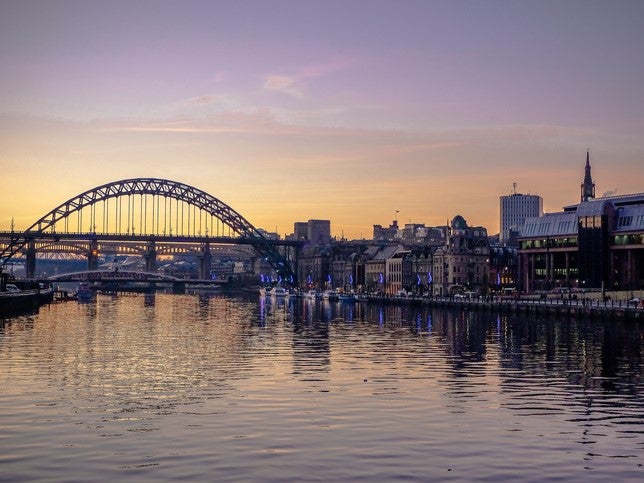‘It’s going to hurt’: Northeast reacts to new restrictions amid fears night-time economy will be devastated
Jobs could be lost and venues forced to closed – but restrictions might be only way to save lives, according to those set to be hardest hit

At Vinyl, an Italian restaurant in the Wearside town of Washington, the cancellations have already started.
“Two or three within a couple of hours,” says owner Conor Snary. “For an independent like us, that’s a huge loss. I know it’s happening to others too. The next few weeks, it’s going to be a struggle.”
Residents and business owners across the northeast of England have expressed frustration and fear – but also some bullishness – after new coronavirus restrictions were announced by the government.
Pubs and restaurants will have to shut by 10pm and members of different households will be banned from socialising under the new measures, implemented after Covid-19 cases tripled there in just three weeks.
More than 1.5 million people living in Northumberland, Newcastle, Sunderland, North and South Tyneside, Gateshead and County Durham will be affected by the new rules, which come into force at midnight.
And among the biggest fears are that the area’s considerable night-time economy – worth £340m a year in Newcastle alone – will be left devastated.
“It’s going to hurt,” says Snary. “If the argument is that these rules shouldn’t affect restaurants too much because we generally shut at 10pm anyway, then that just doesn’t accord with reality.
“The fact is people here now can’t go out for dinner with someone from another household – which wipes out huge numbers of potential customers because that’s precisely who people do go out to a restaurant with: friends, colleagues, dates. At a stroke, they can no longer eat together.
“Our customer base has just been wiped out.”
Yet in spite of these issues, the 25-year-old – who has already cut the number of covers from 48 to just 20 to enable social distancing – says he supports the measures.
“If this helps bring the virus under control and saves lives, how can you argue with it,” he asks. “Better this than a full lockdown. My main hope now is that everyone sticks to these rules so we can start to get back to normal soon.”
It is a feeling echoed by Simon Hubbard, manager at the Mean Eyed Cat, officially Newcastle’s best pub according to the Tyneside and Northumberland branch of Camra.
He expresses exasperation at the handling of the pandemic. “You see other countries managing the virus and then you look at us, going in and out of lockdowns,” he says. “What’s that about?”
He adds that he would like the rules to be clearer and he feels more uniformity is now needed across the country rather than a patchwork of different guidelines for different places. “What’s to stop six lads from Newcastle meeting on the border and going for a night out in another city,” he asks.
But he feels that his pub – which has reduced capacity from 58 to 22 since the national lockdown – will survive the rule change.
“I worry for some of the late-night bars,” he says. “But I think a lot of drinkers – those who just want to go out for a nice pint and some company – will just go out a bit earlier."
And he adds: “What I’d hope is that this would encourage other businesses to stick to the rules more. We’ve followed the guidelines since day dot here – because we understand they’re important to keep people safe – but maybe not everyone has done that.”
Does he wish to name names? “I’m not sure some of the chains have taken this as seriously as they could,” he says.
For John Kelly, his worst fear – but also his prediction – is that the new rules will ultimately mean more people using food banks in the area. He has good reason to be concerned too, he says. As a member of both Sunderland City Council and a senior volunteer with the Washington Trust – a charity which supports such services – he’s seen numbers already rising since the end of lockdown.
“People are losing jobs or struggling because other community services have had to shut,” he says. “It’s been awful to see, and it’s going to get worse, there’s no two ways about that.
“But we have to do what we have to do; and right now, we have to keep people safe. We’re all desperate to get our lives back on track but that doesn’t come at any cost. We can’t let this continue spreading. We have to protect our vulnerable and get it under control.”
He adds that too many people have been playing politics when it comes to handling the pandemic. “This should be about saving lives because this illness will get you whatever colour badge you’re wearing.”
Yet not everyone necessarily agrees that the curfew is the right course to be taking.
Speaking to the BBC, Paul Pringle, director of the late-night Intermezzo bar in Newcastle, said he feared the place would have to make redundancies.
“Restaurants and bars cannot survive closing at 10 o’clock,” he said. “Newcastle – the whole of the northeast – predominantly take a lot of their turnover after 10pm.”
Join our commenting forum
Join thought-provoking conversations, follow other Independent readers and see their replies
Comments
Bookmark popover
Removed from bookmarks